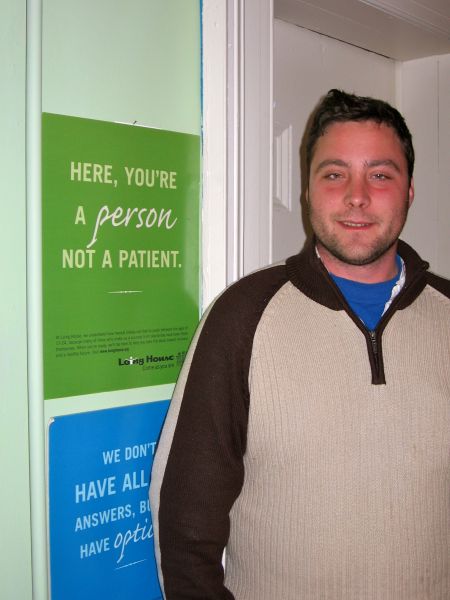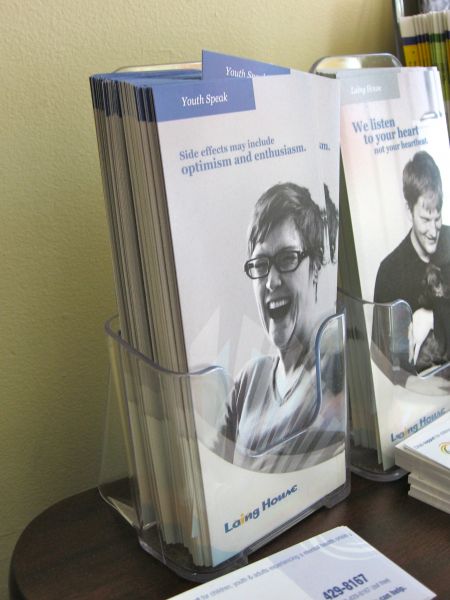Jason Cheverie considers himself “one of the lucky ones.” He was diagnosed with schizophrenia at 21-years-old, allowing him to address his symptoms soon after the onset of his mental illness.
Now 26-years-old, Cheverie is on a medication that subdues his symptoms, is seeing a psychiatrist once a month, and is working toward his industrial engineering technology degree at the Nova Scotia Community College. He is functioning better than he has in years, but getting to this point has involved overcoming one of the greatest hurdles faced by mental illness sufferers: stigma.
For Cheverie, the struggle with stigma began before he was even diagnosed. He describes arriving home from the hospital and his mother not letting him use the stove for fear he would hurt himself. “I wasn’t allowed to cook food and I was the age of 20-years-old,” says Cheverie.
He describes hearing voices and having strange thoughts race through his mind, both common symptoms of schizophrenia. Cheverie says he is always aware of his mental illness - sometimes a routine workout at the gym is interrupted by a frustrating episode - but most of the time, he functions like any other person would.
“A lot of people have this perception that people with mental illness are violent,” says Cheverie, who says the media furthers this misconception.
“Usually, when you see anyone with mental illness in news they’re portrayed as someone doing something violent or a crime…You don’t hear anything about people who are functioning with schizophrenia,” says Cheverie.
These stereotypes have interfered with Cheverie’s social life as well. He says one of his best friends growing up developed an “animosity” toward him soon after he was diagnosed with schizophrenia. People at NSCC are equally hesitant about his mental illness: he can rarely find peers willing to collaborate on group assignments.
“I wonder sometimes what people actually think of me,” says Cheverie.
He admits he hasn’t always known what to think of himself. For a long time he says he couldn’t accept that he had a mental illness and his internalized stigma prevented him from seeking help.
Mental health workers agree that stigma is most serious in the barriers it imposes on getting treatment.
“When stigma keeps people away from trying to access services, you’ve really impacted how well you will do, how much you can recover,” says Peter Duke of Laing House, a Halifax drop-in centre for youth with mental illness.
But when Cheverie finally did get professional help, the experience was less than positive. He remembers being bombarded with medication after medication in order to be “sedated for the entire day and be a non-functioning zombie.” The hospital, to him, was simply a place to make him less of a liability to society, and not a healing environment.
“Health professionals, believe it or not, are people who do a lot of discriminating against people with mental illness,” says Andy Cox, mental health advocate at the IWK Health Centre.
The staff at Laing House has heard countless stories about discrimination behind hospital walls. Duke defines stigma in the health profession as “a mirror image of the stigma that is in greater society,” such as thinking that someone with a mental illness lacks education or career potential.
Staff training to address mental illness stigma at the IWK amounts to zero, according to Cox. The awareness of this stigma is low, adds his colleague Susan Mercer, senior director of the IWK mental health and addictions program.
But he and Mercer are determined to change that, and it begins with Opening Minds.
Opening Minds is a ten-year-long anti-stigma program that was launched by the Mental Health Commission of Canada in 2009. The goal: evaluate already existing anti-stigma programs targeting youth and health care providers across the country to determine which methods of education have the greatest impact. The initiative has since been expanded to tackle workforce and media stigma.
Of over 250 submissions to Opening Minds, just over 50 pilot projects were selected for review. Halifax is home to two of the selected entries: Laing House’s Youth Speak, focusing primarily on youth, and the IWK’s mental health and addictions anti-stigma campaign, focusing on health care providers.
Youth Speak began in 2002. It consists of presentations centered on the personal experiences of mental illness sufferers. Members of Laing House deliver them. Youth Speaks have been given around Halifax to many audiences, from grade school kids, to Dalhousie medical students, to IWK employees, to public forums on mental health.
Last year, Youth Speak gave 80 presentations to over 5,000 people, reports Duke who has coordinated the program for four years.
“The real height of Youth Speak is members talking about their experience: what it was like when they got sick, what their life was like before their got sick, how that has affected them, how it has impacted their relationships, their goals, and the types of things they do to keep themselves well,” explains Duke.
Cheverie’s first presentation was to a group of grade nine students in Dartmouth. He became involved with Youth Speak one year ago and has since done 25 workshops. He enjoys using stories that will make the audience laugh. His favorite is the recounting of a simple stroll down the block being interrupted by a tree asking for a cup of coffee.
These stories seek not only to make audiences less discriminatory toward mental illness sufferers, but also to push the presenters to overcome their self-stigma. Cheverie says he’s gained confidence and public speaking experience. He’s also become more comfortable with his illness.
“You feel great after you do a ‘speak’,” he says. “You feel so wonderful that you’ve actually gone and told your story to someone.”
Cox is less enthusiastic about the IWK’s program. "I think one of the reasons [the IWK’s work against stigma is less effective] is because not everybody in our hospital or not even in our program is passionate about it,” he says.
The IWK’s mental health and additions anti stigma campaign began last spring. It has since consisted of poster campaigns and celebrations during mental health awareness week. A survey of the treatment of mental illness patients in the emergency room is ongoing.
“I think we quickly recognized that what we were doing was nice but we weren’t sure, we weren’t aware it was making a difference,” says Mercer who coordinates the campaign. “Is it actually changing behavior and reducing stigma?”
Grassroots programs have proven more effective in the Opening Minds initiative. Funding and flexibility options are the keys to their success, says Maureen Fraser-McLaughlin, executive director of Laing House:
"I think a lot of the time when you compare Laing House to a big institution they're burdened by policy and procedure, whereas we are much more nimble and, so, we're able to respond quicker to members' interest or the community's interests and go in that direction.”
As such, it has taken the IWK until this year to “go through the process of anything that gets offered in the Health Centre, to ensure that the CEO and your executive leadership and human resources and those people are all aware and on board,” says Mercer.
On May 2, the IWK will be test running a program first developed at the Central Local Health Integration Network in Markham, ON. This two-hour workshop consists of mental illness sufferers explaining the impact of stigma on health care and their recovery, as well as training material such as power point presentations, workbooks, videos, activities and discussion.
Mercer is confident the program will fit the IWK’s needs, as it has been successfully implemented in other hospitals.
“My hope is that we’ll be able to use what they’ve tried and [it] works so that we’re not spending a lot of time reinventing,” says Mercer.
There is something to be said about reinvention, however. Laing House knows its benefits well. Duke has worked individually with Youth Speak presenters to draw out the elements of their stories that are appropriate and most helpful to each audience.
“I would say that they’re living workshops: everyone might be a little different,” he says.
Cheverie has discussed in his presentations everything from classroom episodes to encounters with hospital security guards, depending on his audience. The diversity of stories allows him to learn more about his illness with each presentation.
Cox is working with Laing House and a local speakers bureau to acquire first hand experience presenters like Cheverie that would fit with the IWK’s workshop. He says the inclusion of different stories will “help change it up,” though the workshop itself is very generalized. Although the material has proven to be effective in battling stigma, the sustainability of such an impact worries Mercer: a stagnant program cannot keep up with the ever-changing field of mental illness.
“The flexibility that grassroots programs can have, they can be responsive,” says Duke. “We have our agenda about reducing stigma but it's not that we have all these things that are tying us down that we have to stay on a particular message. We have an idea of what we want to do but we have the flexibility and freedom to do it and in whatever way makes sense."
Duke adds that this flexibility comes from acknowledging that even those who work in the mental health field, including himself, are susceptible to stigma and do not know everything there is to know about mental illness.
"I don't think that our members are immune to these really powerful forces in our society,” he says.
Cox agrees, saying that health care providers tend to be narrow minded when it comes to the issue of stigma, and what he called the “ivory tower” has largely gotten in the way of mental health professionals accepting their own discriminatory practices.
It is unknown as of yet if the IWK workshop will be mandatory for the 3,000 staff at the Health Centre. Mercer hopes that most employees will eventually get exposed to it.
Meanwhile, Laing House is planning on expanding its Youth Speak program to include a video component. It also wishes to deliver its presentations to areas outside the HRM.
While Cheverie, members of Laing House and the IWK agree that openness toward and understanding of mental illnesses has improved over the past few years, there is still much work to be done. Education on mental illness has been shown to increase people’s identification of symptoms, leading to earlier treatment, greater empathy, and more funding in the mental health field.
But making this education accessible and effective all ties back to the elimination of stigma.
“At the end of the day,” says Fraser-McLaughlin, “this is really about trying to help people understand that just because you have schizophrenia, bipolar, whatever, doesn't mean you're going to be a violent criminal, it does not mean you will not graduate university at the top of your class, it does not mean you will not go on to have a wonderful career and a family and kids and everything else that people go and do in life.”




